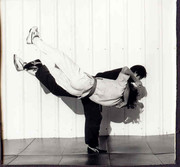Hanzou
Grandmaster
I'm not a Judo guy. I don't know Judo only has 5% ground.
If we’re classifying “ground” as what is taught in modern Bjj/submission grappling, then I would definitely say that Judo is 5% ground in comparison, and that percentage is constantly shrinking. Ten years ago I would say that a black belt in Judo would be about a mid to upper level blue belt in Bjj in terms of ground fighting skill. Now I would say they would be an upper tier white belt or lower. Bjj has evolved that much in the past decade, and simply continues to do so.

